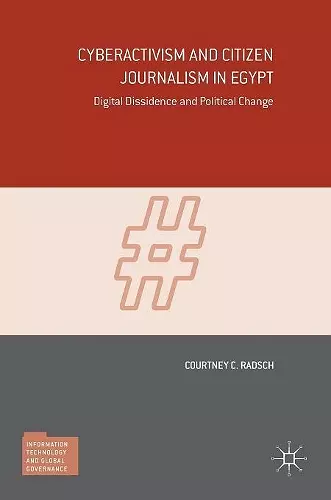Cyberactivism and Citizen Journalism in Egypt
Digital Dissidence and Political Change
Format:Hardback
Publisher:Palgrave Macmillan
Published:24th Sep '16
Currently unavailable, and unfortunately no date known when it will be back

"Radsch's book helps fill a major gap in systematic research on the role of digital media in the 2011 Arab Spring. Combining insights derived from many years of first-hand experiences with a rigorous and erudite understanding of social, political, and media theory, Rasch puts forward a nuanced analysis of how digital dissidence affected political change. A must read for students of social movements." (Ronald Deibert, Professor of Political Science and Director of the Citizen Lab at the Munk School of Global Affairs, University of Toronto, Canada) "Radsch provides distinct insights into the real world of cyber activists. Based on in-depth research, the book delves into the lives of bloggers, the risks they take, their aspirations and strategies and how their efforts played a significant role years before January 2011. Radsch's account is an important contribution in telling a crucial side of the story of the Egyptian Revolution to the world." (Nancy Okail, PhD, Executive Director, The Tahrir Institute for Middle East Policy) "Radsch has produced a work of original scholarship that brings unique insights into the relationship between online discourse and events that played out in the streets during a critical period of Egypt's recent history. Her offers valuable insight into the present and future of online movements in the Arab world and beyond." (Rebecca MacKinnon, author of "Consent of the Networked" (2012))
This compelling book explores how Egyptian bloggers used citizen journalism and cyberactivism to chip away at the state’s monopoly on information and recalibrate the power dynamics between an authoritarian regime and its citizens.This compelling book explores how Egyptian bloggers used citizen journalism and cyberactivism to chip away at the state’s monopoly on information and recalibrate the power dynamics between an authoritarian regime and its citizens. When the Arab uprisings broke out in early 2011 and ousted entrenched leaders across the region, social media and the Internet were widely credited with playing a role, particularly when the Egyptian government shut down the Internet and mobile phone networks in an attempt to stave off the unrest there. But what these reports missed were the years of grassroots organizing, digital activism, and political awareness-raising that laid the groundwork for this revolutionary change. Radsch argues that Egyptian bloggers created new social movements using blogging and social media, often at significant personal risk, so that less than a decade after the information revolution came to Egypt they successfully mobilized the overthrow of the state and its president.
ISBN: 9781137497895
Dimensions: unknown
Weight: 5761g
351 pages
1st ed. 2016